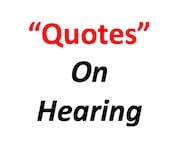A person who has hearing loss needs help.
This is a truism – it’s self-evident and can’t be argued. It’s almost impossible to self-diagnose and accurately self-prescribe effective solutions. A person with hearing loss may choose to not reach out for help, to decide against finding out the cause of the hearing loss, to elect not to be tested, and to oppose using any assistive technology beyond turning up the volume on the TV, phone or computer.
But if a person wants to hear better and to enjoy overall better health, they need to seek help. The hearing professional is a good place to start, and is a good partner on the hearing journey. He or she will conduct tests to ascertain a person’s hearing level and to rule out any problem requiring medical attention. Based on the results, the audiologist will make recommendations, which is often includes a hearing aid. The client’s next step is the Wide World of Assistive Technology and its unbelievable array of devices that boost hearing.
But advocates for people with hearing loss constantly beat the drum of another important and often crucial source of support – other people with hearing loss. Consumer hearing loss organizations provide people with access to tried-and-true information and tools for navigating the hearing loss life. And if they choose, they will meet other people who also have hearing loss, who are walking the same walk and who are happy to share what they’ve learned about all areas of the hearing loss life: technology, relationships, on the job, navigating the health system, how to self-identify and self-advocate.
There is a profound sense of relief in connecting with other people who understand what you’re going through. This kind of support isn’t usually offered in the audiologist’s office. And it’s this stuff that can make the difference between being successful and not so successful in overcoming communication barriers.
While organizations can offer support through their website, at meetings or at a conference (and trust me, they’re fun!), there’s a more personal type of connection that offers confidential, one-on-one discussion. Peer mentoring is a proven program that helps people adjust to new jobs, in their educational studies and dealing with an illness or disability. Because of the life and lifestyle changes that come with hearing loss, volunteer peer mentors, who also have hearing loss, will work with the person needing support for as long as the person wants it.
For the past year or so, I’ve been a volunteer in the online peer mentoring program through the B.C. Chapter of the Canadian Hard of Hearing Association. Funded by WorksafeBC, the program aims to reach people in British Columbia who may not live in an area where hearing loss meetings are held, or who have no interest in joining a group. What they do need is answers.
I have worked with four “mentees”, starting with a gentleman who basically wanted to talk about hearing aid technical platforms – he wasn’t looking for a support network and didn’t come back for a second chat. (Whew!) My other online mentoring relationships have been more rewarding for both for the mentee and me. The job of a trained volunteer is to listen and offer support, experience and knowledge on a timeline that works for the mentee. Sometimes, a mentee simply wants to vent and that’s OK too.
Mentees can choose the mentor they would like to work with; mentor’s pictures and biographies are posted on the website cover a range of age, hearing loss type, gender, and age. The ‘meetings’ are held in a specially designed chat room designed to keep the mentor’s identity anonymous, although my current mentees recognized my picture on the website, so anonymity has not been an issue.
I know that peer support works; I was anxious about how my hearing loss might prove dangerous for my child, and a hard of hearing mom spent time with me, assuring me that I could do this – and she no only calmed my nerves, but also helped direct me to a new life as a hearing loss advocate.






